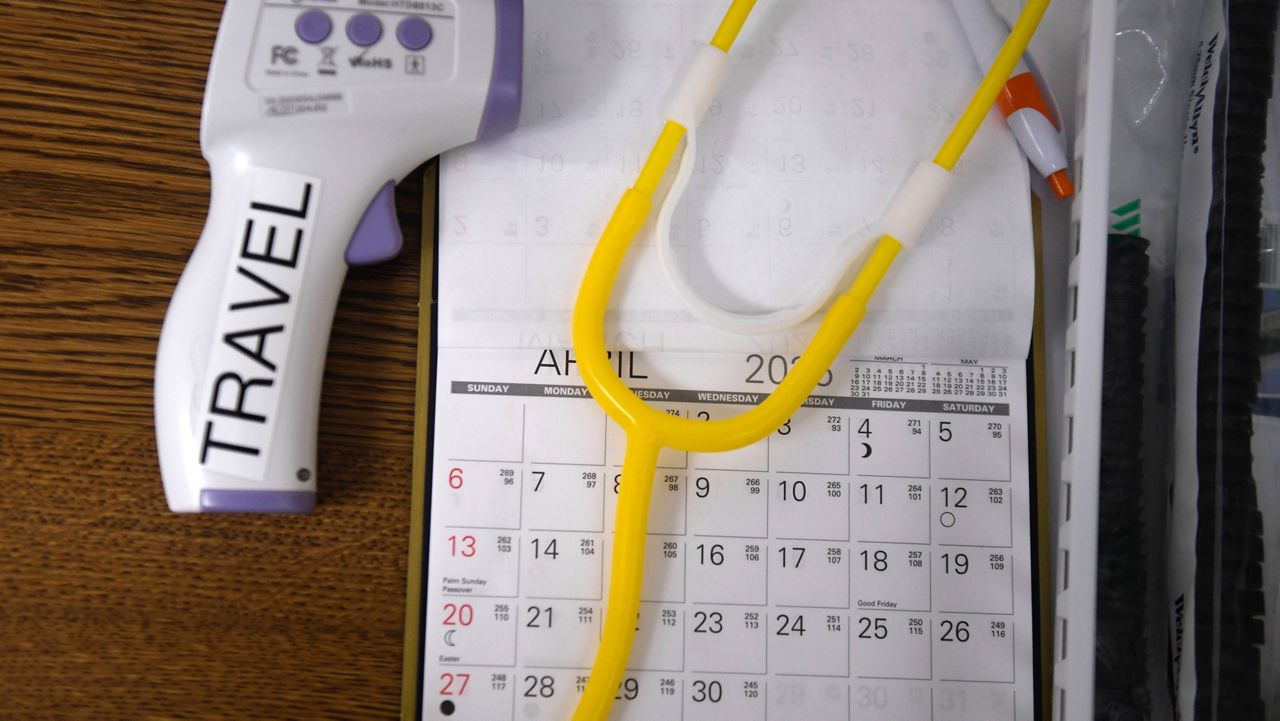There’s no way of discussing the state of public health in North Carolina without mentioning Dr. Mandy Cohen.
What You Need To Know
- Dr. Mandy Cohen spoke at UNC's Match Day
- Cohen is the former state health secretary turned CDC director
- American confidence in the medical system sits at a historic low
- Multiple soon-to-be residents talked about their match
The former state health secretary was in Chapel Hill last Friday, talking to University of North Carolina Medical School students about entering health care on their match day. “I remember my match day. It was 20 years ago,” Cohen said as she stood before an auditorium full of people. “What I will tell you is not only should you be saying ‘thank you’ to those who have helped you along the way, but just know that the friends you have made here at UNC and the friendships you will make in residency will be your lifelong friendships.”
Her speech came at a time when these future doctors learn where they'll spend the next few years as residents in their specialty field for the next three to seven years. Cohen is a graduate of Yale University Medical School.
Cohen’s address also comes at a moment in the world of health care where many are hanging up their masks and gowns for good. The American Hospital Association's 2023 Health Care Workforce Scan showed while shortages affected the field before the emergence of the COVID-19 virus, the “pandemic intensified the issue, with as many as 47% of health care workers planning to leave their jobs by 2025.”
Now, N.C.’s top former health employee sees these issues from an even bigger perch as the nation’s top health administrator. Cohen said she can make even more informed decisions since taking the role of CDC director last summer.
Before fueling bright-eyed and bushy-tailed medical minds with inspiration, she talked to Spectrum News 1 about her message to future workers.
“I was so lucky to see the field of medicine through my mom's eyes," Cohen said. "She was a nurse practitioner in an emergency room, and I saw two things. One, I saw her be that caregiver in our community. People would stop her in the grocery store and say, ‘thank you so much. You helped my mom, my sister, last night in the emergency room.'"
But Cohen said even at a young age, the cracks in America’s health care model stood out just as much.
“The other side I saw were the broken parts of the health care system, because she was in an emergency room. And so it gave me an appreciation, both of how do you be that trusted, caring person in someone's life when they're going through a hard time. But also, how do you fix the system, that I saw through her eyes, that really wasn't working for everyone?”
Kandis and Cy Fogleman are one couple who received their match last week. The soon-to-be UNC Med School graduates have their eyes set on what the needs are for communities outside cities and said Cohen’s words resonated.
“For me, it’s about following what I feel is my God-given purpose,” Kandis Fogleman said. “I grew up in a rural area, so I really saw the health care shortage issues that exist. And as you mentioned, you know, they're only getting worse. So I really want to I feel like my purpose in life is to go out and help not only as a clinical physician to help fill those shortages needs, but also to work legislatively and to advocate for people in rural areas, to continue to recruit people to health.”
It’s no secret to Cohen and to the future workforce that earning the public’s trust is as crucial as ever.
A Gallup news poll showed as of July 2023, only 34% of survey respondents polled had “a great deal or fair amount of confidence” in the American medical system.
Cohen worked on the frontlines of the information war in N.C., using public addresses during the pandemic to update rates of transmission, deaths and hospitalizations for the novel coronavirus to separate fact from fiction for families at home.
She said learning from the past will shape how we address the needs in the present.
“During the COVID crisis was some of the most amazing hard times of my career. It's about building a foundation of trust. And I take lessons like making sure we're being transparent, right? So we're communicating effectively in a simple way, repetitively, right? So we're communicating effectively in a simple way, repetitively. Folks here in North Carolina, remember how often we were on television through the COVID pandemic, sharing everything we possibly could in real-time,” Cohen said. “So transparency, [and] communicating, [are] really important. And the second part, though, it wasn't just about saying words, it was about showing up for people and doing the work and making sure we were executing well, operating well.”
Becoming a trusting and trusted messenger of sound health advice has been a lifelong dream for Wake Forest University Med student Jimshad Farooque–Wooden. He talked about his residency match the same day Cohen gave her address. “Such a huge relief. So many mixed emotions. Happiness, excitement. I’m excited to be back at Duke for my residency,” Farooque-Wooden said.
The National Center for Health Workforce Analysis, which is overseen by the Health Resources and Services Administration, projects a shortage of nearly 140,000 full-time physicians by 2036.
The statistics translate to a demand for a higher volume of compassionate, talented and quality medical workers.
“I know it’s going to be a big learning curve, and I’m just ready,” Farooque-Wooden said.
Cohen reiterated what it takes to be successful in the business of providing responsible health care to this next crop of one-day physicians.
“It's about having a good relationship. It's about showing up, being in person, caring about the other person, and understanding how you can work together and find those places where you do agree and you can move forward to build those healthier communities,” Cohen said.“It's about having a good relationship. It's about showing up, being in person, caring about the other person, and understanding how you can work together and find those places where you do agree and you can move forward to build those healthier communities,” Cohen said.
Whether it’s the opioid epidemic, working through a cyberattack on patient data collection, capping drug prices, or talking to folks across the country about vaccinations, Cohen believes there are plenty of opportunities for these new residents to lend a hand in the field of medicine.
“These are hard careers, but we are so grateful, and it is such so important and necessary. You have so many amazing moments laid out for you and to say we need you, this country needs you,” Cohen said.
Cohen knows the cooperation of state and national leaders can be hard to earn. Most recently, the State Department of Labor Commissioner Josh Dobson said he would not enforce mask-wearing in workplaces should another public health crisis arrive. Dobson, a Republican, announced on March 13, that his refusal came “after carefully reviewing the rulemaking petitions, the record, public comments, listening to both sides and considering the North Carolina Department of Labor’s statutory authority.” To that end, Dr. Cohen said we must continue investing in our communities to make sure life-saving resources like masks, shots and fact-based information are within reach to protect the people who need it most.
“As a CDC director, I am now very aware of all of the health threats that are out there and while we're in a better place with COVID, there are other threats that are out there," Cohen said. It's why we do the work at CDC every day to protect health.”










